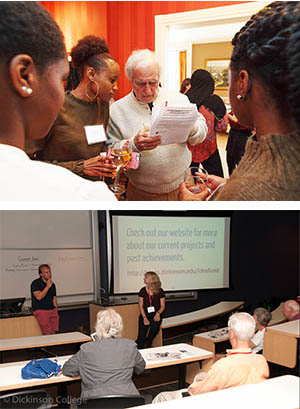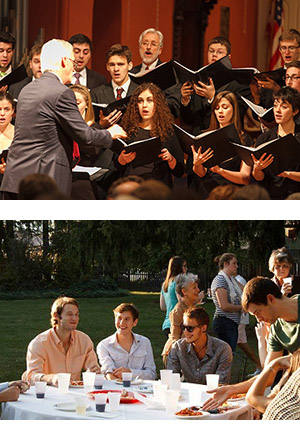
Above: Sam Rose ’56, consulting with students at the Historic President’s House.
Below: Adult learners on campus to coach Dickinson students on developing their Idea Fund projects.
OUR REVOLUTIONARY VISION
Dickinson+ represents a bold redefinition of a liberal arts education that involves enhancing the traditional undergraduate experience by fully integrating learners of all ages in the enterprise. There are substantial synergies to be capitalized on as this win-win-win transformation unfolds to the mutual benefit of:
- The growing (but often over-looked) sector of adult learners;
- Traditional undergraduate students, and;
- The forward-thinking liberal arts institutions that have the imagination and pluck to bring them together.
This is Dickinson’s time to lead the higher education sector toward fully realizing the potential benefits of what — twenty years from now — we see as the new, intergenerational students-of-all-ages paradigm for the undergraduate institutions who survive the natural selection process of winnowing that is now well underway. Benjamin Rush, Dickinson’s visionary founder who championed several radical educational causes that became orthodoxy in time (e.g., education of women, education for utilitarian purposes, and education for engaged citizenship) would have us aim for nothing less.
AUDIENCE [1]
Dickinson+ would begin this transformation by swinging classroom doors wide open to adult learners who are excited about the opportunities to:
- Expand and deepen their own understanding of and engagement with the world around them;
- Participate fully in the culturally rich life of the college, and;
- Share their own knowledge and knowledge networks with traditional students.

Above: Dickinson chamber music ensemble, 2014.
Below: The Italian Club’s “Welcome Back” dinner, 2017
APPROACH
Dickinson+ would seek to fully integrate alumni and other non-traditional students into the life of the college in a variety of different ways that would enrich the lives of older and younger students alike, while also providing a return on investment to the college.
- Auditing classes: Currently, only about two-thirds of all available classroom seats are occupied by traditional Dickinson students in a typical semester, leaving one-third (approximately 4,000 seats!) unoccupied. Filling those seats with adult learners who remain eager to engage in the educational process could go a long way toward helping the college monetize this excess capacity. [2]
- Earning credit toward a degree: Some adult, non-alumni learners may want to work toward earning a Dickinson degree, which would also be allowed on a space available basis (and at a higher rate than auditing students).
- Extra-curricular and co-curricular activities: Adult learners with requisite talents would be welcome to participate in college choirs and other musical ensembles that practice and perform throughout the year. Some might learn to weld and supervise the welding shop. Others might choose to serve as docents or art educators in the Trout Gallery. Those with the gift of a second language and those looking to enhance their language skills could join language-table groups that meet weekly to share a meal and practice foreign language conversation. Proficient language speakers could also serve as tutors to traditional students. The possibilities here are quite literally endless.
- Civic learning and engagement. Many adult learners would bring to campus a wealth of non-profit board experience and could help mentor students on how best to connect with volunteer opportunities in the local community. In some cases, adult learners and students might actually co-create nonprofit organizations where it is observed that needs in some areas are not being met.

Above: The first-floor living room of “The Alumni House @ Dickinson” has ample space for classes, talks, presentations, and receptions.
Below: Dickinson students meet up with alumni at a networking event.
PHASE I: The Alumni House @ Dickinson
The Alumni House @ Dickinson, created in the renovated Historic President’s House, would serve as the intellectual home and center of gravity for Dickinson+ initiatives. In addition, The Alumni House @ Dickinson could provide a number of spaces specifically designed to provide quality opportunities for alumni to deepen their engagement with the college and with students currently in attendance. Some of the possibilities include:
-
- Space for a drop-in center for Dickinson alumni (staffed M-F during business hours);
- Spaces for trustee and alumni council meetings and events;
- Spaces where students could meet with and network with alumni;
- Space for programming developed specifically with adult learners in mind [3], and;
- Revenue-generating event and lodging space for times when the house was not being used for functions related directly to Dickinson+. [4]
The Historic President’s House is one of Dickinson’s signature historic buildings. The house also serves as a prominent locus of first impressions, located at perhaps the busiest of the several gateways to campus; the corner of High St. and West St. But the structure is underused, currently lays fallow most of the year, and is beginning to show its age. Meanwhile, Dickinson has many of the same challenges as its peers with regard to alumni affinity, the engine that drives the college forward in so many important and interrelated ways. Transforming the Historic President’s House into The Alumni House @ Dickinson marries the latent capacity of this grand old house with the pressing needs of the college in a way that opens doors to an even broader re-imagination of what a liberal arts education can be. The time is right, the location is ideal, and the opportunities are boundless for Phase I of Dickinson+ — The Alumni House @ Dickinson: A place to come home to.
NOTES
[1] Although much more market research needs to be conducted, we note that scores of alumni, emeriti faculty, and retired administrators from Dickinson, the Dickinson School of Law, and the War College live in the area. In addition, the Carlisle area is the adopted home to many scores of retired military officers (Cumberland County has 60% more veterans than the average in the U.S.). In addition, nearly 300 officers (many with accompanying family members) cycle through the U.S. Army War College every year. [2] We do this already, but we do not market or promote the opportunity and realize only a small fraction of the potential benefit as a result. We also note that capitalizing on unused capacity in this way can be accomplished without damaging our student–faculty ratio, one of the key factors considered in college ranking systems such as the one published by US News & World Report). [3] For models, see 5CLIR; the 5-college peer-led, lifelong learning consortium based in Northampton, MA. See also programs sponsored by the Osher Lifelong Learning Institute. [4] We anticipate the revenue-generation potential of the house and grounds to be modest, but not insignificant.